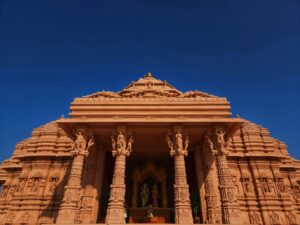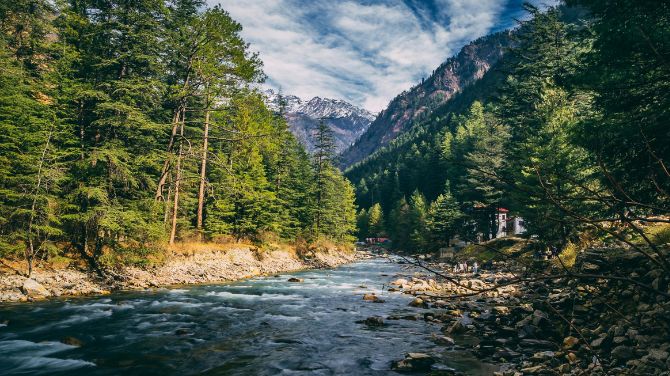Ayodhya, the sacred city on the banks of River Sarayu in Uttar Pradesh, is synonymous with spirituality, devotion, and heritage. Known as the birthplace of Lord Rama, it holds a special place in the hearts of millions of Hindus worldwide. Pilgrims visit Ayodhya to seek blessings, explore ancient temples, and connect with the timeless stories of Ramayana. Here is a detailed guide to the most famous Ayodhya tourist places, from the revered Ram Janmabhoomi to the mighty Hanuman Garhi, that you must include in your pilgrimage itinerary.
Ram Janmabhoomi: The Birthplace of Lord Rama
The foremost among all Ayodhya tourist places is Ram Janmabhoomi, believed to be the exact birthplace of Lord Rama. This sacred site is under grand construction to build the magnificent Ram Temple, which will stand as a symbol of devotion and India’s spiritual heritage. Devotees visit to offer prayers, seek blessings, and experience the divine aura of this historic site. The atmosphere here is filled with chants of “Jai Shri Ram”, creating a spiritual vibration that uplifts every pilgrim’s soul.
Hanuman Garhi: The Protector of Ayodhya
Hanuman Garhi is the second most visited temple after Ram Janmabhoomi. Dedicated to Lord Hanuman, this temple is situated atop a hillock, requiring devotees to climb around 76 steps to reach. The temple houses an idol of Hanuman ji sitting with his mother Anjani. According to legends, Hanuman ji lived here to protect Ram Janmabhoomi. Devotees believe that visiting Hanuman Garhi before Ram Janmabhoomi is auspicious as Hanuman ji grants strength and removes all obstacles from their path.
Kanak Bhawan: The Golden Palace of Sita-Ram
Kanak Bhawan, located near Ram Janmabhoomi, is one of the most beautiful Ayodhya tourist places. It is believed to have been gifted to Goddess Sita by Queen Kaikeyi after her marriage with Lord Rama. The temple is adorned with intricately designed golden-crowned idols of Lord Rama and Sita. The devotional songs, serene ambience, and beautiful architecture make it a must-visit for devotees and heritage travellers.
Nageshwarnath Temple: The Shiva Temple Established by Kush
Nageshwarnath Temple, dedicated to Lord Shiva, is believed to have been established by Kush, the son of Lord Rama. According to legend, Kush lost his armlet while bathing in the Sarayu River, which was found and returned by a Nag-Kanya who was a devotee of Lord Shiva. Kush then built this temple in gratitude. It is one of the oldest temples in Ayodhya and remains crowded, especially during Mahashivratri.
Treta Ke Thakur: Where Lord Rama Performed Ashwamedha Yagna
Treta Ke Thakur is a famous temple housing black sandstone idols of Lord Rama, Sita, Lakshmana, Bharat, Shatrughna, and Hanuman. It is believed that Lord Rama performed the Ashwamedha Yagna here. The temple opens for devotees only once a year on Ekadashi, making it a rare and highly significant place to visit in Ayodhya.
Guptar Ghat: Lord Rama’s Final Departure
Guptar Ghat, situated on the peaceful banks of River Sarayu, is where Lord Rama took Jal Samadhi, leaving his mortal body and ascending to Vaikuntha. The ghat is lined with temples such as Chakra Harji Vishnu Temple, enhancing its spiritual significance. Devotees take a holy dip here, perform rituals, and spend time in meditation, absorbing the tranquillity and divine energy of the place.
Sita Ki Rasoi: The Divine Kitchen of Goddess Sita
Located near Ram Janmabhoomi, Sita Ki Rasoi is an ancient kitchen believed to have been used by Goddess Sita. Today, it is a temple showcasing traditional kitchen utensils and idols of Sita, Rama, Lakshmana, Bharat, and Shatrughna. This place symbolises Sita’s role as an ideal homemaker and queen and is a unique site among Ayodhya tourist places.
Mani Parvat: The Hill with Mythological Significance
Mani Parvat is a small hillock believed to be a part of the Sanjeevani mountain carried by Hanuman to Lanka for Lakshmana’s treatment. Atop the hill is a temple with idols of Lord Rama, Lakshmana, and Hanuman. The site offers panoramic views of Ayodhya city and is an ideal spot for meditation and quiet reflection amidst nature.
Tulsi Smarak Bhawan: In Memory of Goswami Tulsidas
Tulsi Smarak Bhawan is dedicated to Goswami Tulsidas, the great poet who composed Ramcharitmanas. It houses a museum with artefacts related to Tulsidas and Ramayana and a library with rare manuscripts. Daily Ramayana recitations and Ramleela performances attract devotees, scholars, and cultural enthusiasts, making it a must-visit among Ayodhya tourist places.
Ramkatha Park: Cultural and Spiritual Gatherings
Ramkatha Park is a well-developed cultural park used for spiritual discourses, devotional music concerts, and cultural programs. It is an ideal place for families and travellers to relax after temple visits and enjoy the stories of Ramayana narrated by local artists and scholars.
Conclusion
Ayodhya is a city that offers much more than temples; it is a journey through India’s spiritual, cultural, and mythological heritage. From Ram Janmabhoomi to Hanuman Garhi and other famous Ayodhya tourist places, each site carries stories of devotion, righteousness, and timeless wisdom. Whether you are a devotee seeking blessings or a traveller exploring India’s ancient roots, a visit to Ayodhya will leave you with peace, faith, and memories to cherish for a lifetime.















Leave a comment